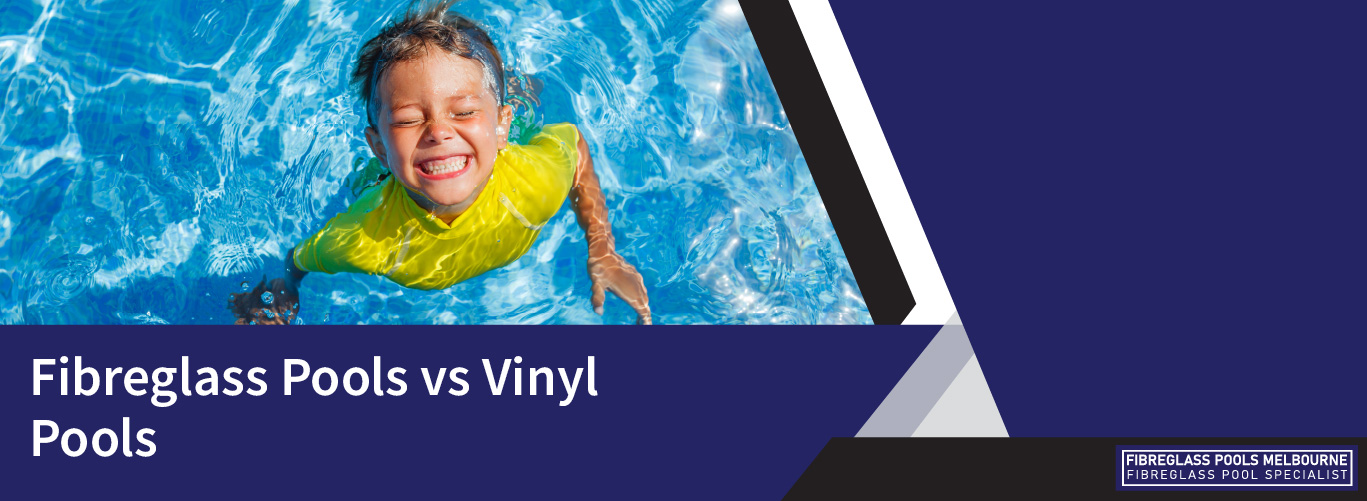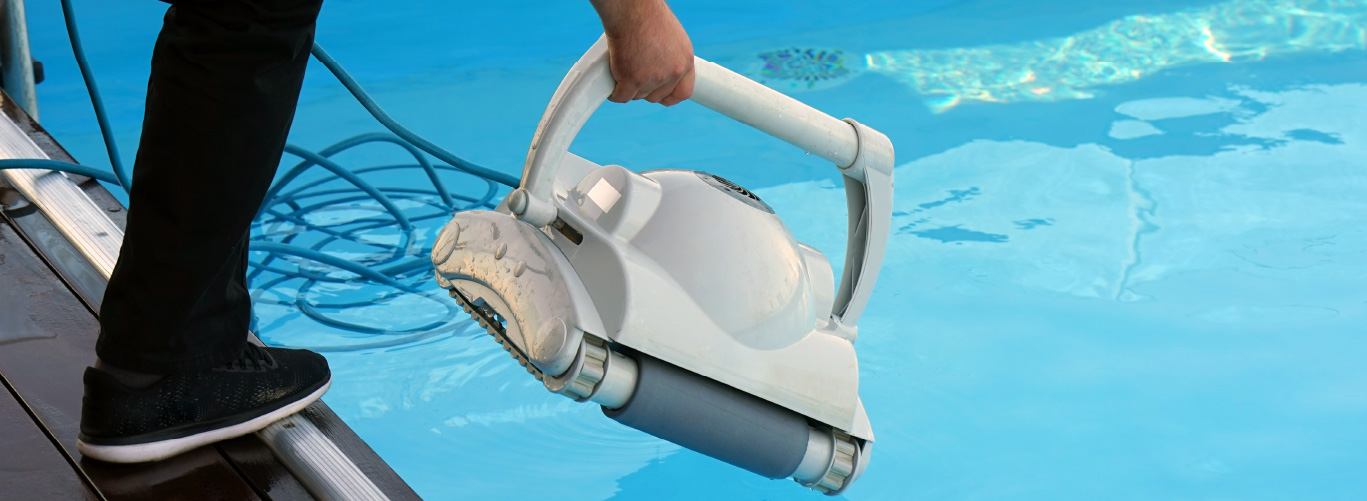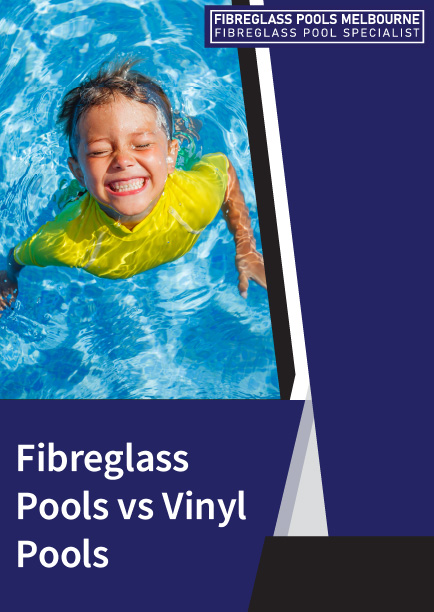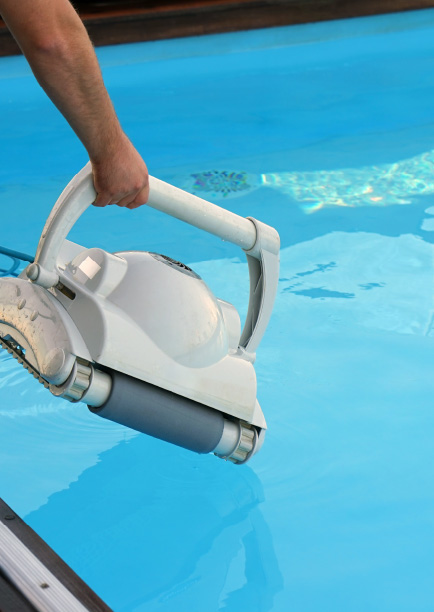Fibreglass Pools vs Vinyl Pools
When it comes to selecting the perfect swimming pool for your home, the options can be overwhelming. Two popular choices in the market currently are fibreglass and vinyl liner pools. Let's delve into the specifics of each type and compare them based on various factors to help you make an informed decision.

Material and Construction
Fibreglass Pools
Fibreglass pools, also known as fibreglass pools, offer a convenient solution for homeowners. These pools are meticulously manufactured in a factory, ensuring high quality and durability. Once completed, they are delivered and professionally installed in your yard as a single unit, minimising any potential disruptions. With their smooth and non-porous surface, fibreglass pools effectively resist the growth of algae, providing a clean and pristine swimming environment. This feature not only enhances the aesthetic appeal but also reduces the need for extensive maintenance efforts. By opting for a fibreglass pool, you can enjoy the benefits of a hassle-free and long-lasting swimming experience.
Vinyl Pools
Vinyl liner pools, on the other hand, are crafted on site. A durable and watertight vinyl liner is fitted over a sturdy steel or polymer frame that has been expertly shaped to form a secure foundation within a carefully excavated hole in the ground. This construction method allows for endless possibilities in terms of shape and size, providing unparalleled flexibility and customization options for those seeking a truly bespoke swimming pool experience.
Installation Process and Time
Fibreglass Pools
The installation of a fibreglass pool is relatively quicker compared to other pool types, typically taking about 2-6 weeks. This is because the pre-manufactured shell, made of durable fibreglass material, is designed to be easily placed into the excavated hole and levelled. The process involves meticulous attention to detail to ensure proper alignment and stability. Additionally, fibreglass pools offer a smooth and sleek finish, providing a luxurious and inviting swimming experience for years to come.
Vinyl Pools
Vinyl liner pools, known for their custom-built nature, typically require a longer installation timeframe. The meticulous process, spanning approximately 8-10 weeks, entails several key steps. This includes meticulously constructing the pool frame, ensuring precise measurements and alignment, followed by the careful installation of the vinyl liner, resulting in a smooth and aesthetically pleasing finish.

Cost Factors
Fibreglass Pools
Fibreglass pools, while initially more expensive, are a worthwhile investment in the long run. Their lower long-term maintenance costs can be attributed to reduced chemical usage and the need for fewer liner replacements, if maintained properly some fibreglass pools can last 20+ years. This not only saves you money but also ensures a hassle-free swimming experience for years to come. So, if you’re looking for a cost-effective and durable pool option, fibreglass is definitely worth considering!
Vinyl Pools
Vinyl liner pools are a popular choice due to their lower initial cost compared to other pool types. However, it’s important to consider that the liners of these pools typically require replacement every 5-9 years, which can add to the long-term costs associated with maintaining the pool. This periodic replacement of the liner is an important factor to keep in mind when considering the overall cost and long-term budgeting for a vinyl liner pool.
Environmental Impact
Fibreglass Pools
Fibreglass pools have a relatively low environmental impact due to their long lifespan and minimal need for maintenance and chemical treatments. As they are built to last for many years, the need for replacement is significantly less frequent when compared to other pool types. Their non-porous surface reduces the need for chemical-based algae treatments, contributing to a healthier environment. However, it’s worth noting that the production process of the fibreglass material does have some environmental impact, as it involves the use of non-renewable resources.
Vinyl Pools
While vinyl liner pools have a lower initial cost, their environmental impact over time can be higher compared to fibreglass pools. This is due to the need for regular liner replacement every 5-9 years, which results in additional material waste. Additionally, the liners, once discarded, take a considerable amount of time to decompose in landfill sites. However, on the plus side, the installation of vinyl pools requires fewer resources and less energy than concrete or fibreglass pools, as there are no heavy shells to transport.
Durability and Maintenance
Fibreglass Pools
Fibreglass pools are renowned for their exceptional durability, making them a long-lasting investment. Not only do they require minimal maintenance, but their non-porous surface also significantly reduces chemical consumption, ensuring a safer and more eco-friendly swimming experience. Additionally, the absence of a liner eliminates the need for costly replacements, providing peace of mind for years to come.
Vinyl Pools
Vinyl pools, while popular for their smooth surfaces and affordability, require more upkeep compared to other pool types. This is because the vinyl liner is susceptible to tears and punctures over time, necessitating regular maintenance and potential liner replacements. Though it may incur recurring costs and be somewhat inconvenient, proper care and attention can help ensure the longevity and enjoyment of your vinyl pool.

Fibreglass Pools vs. Vinyl Pools - Which is Better?
Choosing between a fibreglass or vinyl pool ultimately depends on your personal needs, preferences, and budget. If you’re seeking a long-lasting, low maintenance solution and don’t mind a higher initial cost, a fibreglass pool could be your best bet. Its exceptional durability, minimal upkeep requirements, and eco-friendly attributes make it a worthwhile long-term investment.
On the other hand, if you’re after a budget-friendly option with endless customisation possibilities, a vinyl pool would be a suitable choice. Despite the need for more rigorous maintenance and the potential for liner replacement costs, a vinyl pool offers the unique benefit of shape and size customisation, allowing you to create a pool that fits your vision.
Conclusion
In the end, the choice between fibreglass and vinyl pools is highly personal and should be based on your own specific circumstances and requirements. When it comes to making decisions about your pool, seeking advice from an experienced pool professional is always a wise move. Their expertise can provide invaluable guidance that is specifically tailored to your unique situation. By consulting with a knowledgeable professional, you can gain a deeper understanding of the intricacies involved and make more informed choices for your pool’s maintenance, repairs, and overall enjoyment.
Fibreglass Pools vs Vinyl Pools
When it comes to selecting the perfect swimming pool for your home, the options can be overwhelming. Two popular choices in the market currently are fibreglass and vinyl liner pools. Let's delve into the specifics of each type and compare them based on various factors to help you make an informed decision.

Material and Construction
Fibreglass Pools
Fibreglass pools, also known as fibreglass pools, offer a convenient solution for homeowners. These pools are meticulously manufactured in a factory, ensuring high quality and durability. Once completed, they are delivered and professionally installed in your yard as a single unit, minimising any potential disruptions. With their smooth and non-porous surface, fibreglass pools effectively resist the growth of algae, providing a clean and pristine swimming environment. This feature not only enhances the aesthetic appeal but also reduces the need for extensive maintenance efforts. By opting for a fibreglass pool, you can enjoy the benefits of a hassle-free and long-lasting swimming experience.
Vinyl Pools
Vinyl liner pools, on the other hand, are crafted on site. A durable and watertight vinyl liner is fitted over a sturdy steel or polymer frame that has been expertly shaped to form a secure foundation within a carefully excavated hole in the ground. This construction method allows for endless possibilities in terms of shape and size, providing unparalleled flexibility and customization options for those seeking a truly bespoke swimming pool experience.
Installation Process and Time
Fibreglass Pools
The installation of a fibreglass pool is relatively quicker compared to other pool types, typically taking about 2-6 weeks. This is because the pre-manufactured shell, made of durable fibreglass material, is designed to be easily placed into the excavated hole and levelled. The process involves meticulous attention to detail to ensure proper alignment and stability. Additionally, fibreglass pools offer a smooth and sleek finish, providing a luxurious and inviting swimming experience for years to come.
Vinyl Pools
Vinyl liner pools, known for their custom-built nature, typically require a longer installation timeframe. The meticulous process, spanning approximately 8-10 weeks, entails several key steps. This includes meticulously constructing the pool frame, ensuring precise measurements and alignment, followed by the careful installation of the vinyl liner, resulting in a smooth and aesthetically pleasing finish.

Cost Factors
Fibreglass Pools
Fibreglass pools, while initially more expensive, are a worthwhile investment in the long run. Their lower long-term maintenance costs can be attributed to reduced chemical usage and the need for fewer liner replacements, if maintained properly some fibreglass pools can last 20+ years. This not only saves you money but also ensures a hassle-free swimming experience for years to come. So, if you’re looking for a cost-effective and durable pool option, fibreglass is definitely worth considering!
Vinyl Pools
Vinyl liner pools are a popular choice due to their lower initial cost compared to other pool types. However, it’s important to consider that the liners of these pools typically require replacement every 5-9 years, which can add to the long-term costs associated with maintaining the pool. This periodic replacement of the liner is an important factor to keep in mind when considering the overall cost and long-term budgeting for a vinyl liner pool.
Environmental Impact
Fibreglass Pools
Fibreglass pools have a relatively low environmental impact due to their long lifespan and minimal need for maintenance and chemical treatments. As they are built to last for many years, the need for replacement is significantly less frequent when compared to other pool types. Their non-porous surface reduces the need for chemical-based algae treatments, contributing to a healthier environment. However, it’s worth noting that the production process of the fibreglass material does have some environmental impact, as it involves the use of non-renewable resources.
Vinyl Pools
While vinyl liner pools have a lower initial cost, their environmental impact over time can be higher compared to fibreglass pools. This is due to the need for regular liner replacement every 5-9 years, which results in additional material waste. Additionally, the liners, once discarded, take a considerable amount of time to decompose in landfill sites. However, on the plus side, the installation of vinyl pools requires fewer resources and less energy than concrete or fibreglass pools, as there are no heavy shells to transport.
Durability and Maintenance
Fibreglass Pools
Fibreglass pools are renowned for their exceptional durability, making them a long-lasting investment. Not only do they require minimal maintenance, but their non-porous surface also significantly reduces chemical consumption, ensuring a safer and more eco-friendly swimming experience. Additionally, the absence of a liner eliminates the need for costly replacements, providing peace of mind for years to come.
Vinyl Pools
Vinyl pools, while popular for their smooth surfaces and affordability, require more upkeep compared to other pool types. This is because the vinyl liner is susceptible to tears and punctures over time, necessitating regular maintenance and potential liner replacements. Though it may incur recurring costs and be somewhat inconvenient, proper care and attention can help ensure the longevity and enjoyment of your vinyl pool.

Fibreglass Pools vs. Vinyl Pools - Which is Better?
Choosing between a fibreglass or vinyl pool ultimately depends on your personal needs, preferences, and budget. If you’re seeking a long-lasting, low maintenance solution and don’t mind a higher initial cost, a fibreglass pool could be your best bet. Its exceptional durability, minimal upkeep requirements, and eco-friendly attributes make it a worthwhile long-term investment.
On the other hand, if you’re after a budget-friendly option with endless customisation possibilities, a vinyl pool would be a suitable choice. Despite the need for more rigorous maintenance and the potential for liner replacement costs, a vinyl pool offers the unique benefit of shape and size customisation, allowing you to create a pool that fits your vision.
Conclusion
In the end, the choice between fibreglass and vinyl pools is highly personal and should be based on your own specific circumstances and requirements. When it comes to making decisions about your pool, seeking advice from an experienced pool professional is always a wise move. Their expertise can provide invaluable guidance that is specifically tailored to your unique situation. By consulting with a knowledgeable professional, you can gain a deeper understanding of the intricacies involved and make more informed choices for your pool’s maintenance, repairs, and overall enjoyment.


